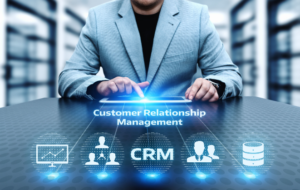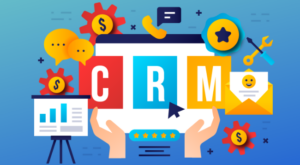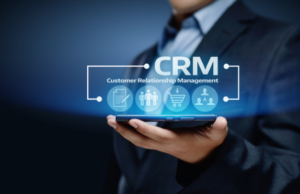CRM Software for Business Management – Discover the best CRM software for business management in 2024! Compare top solutions, explore benefits, pricing, and features. Find out where to buy and how to implement the best CRM for your business needs.
Best CRM Software for Business Management in 2024 – Top Solutions for Efficiency & Growth

Customer Relationship Management (CRM) software is crucial for businesses aiming to improve client interactions, boost efficiency, and drive sales growth. With the right CRM software, you can streamline communication, manage customer data, automate marketing, and more.
In this article, we’ll explore the best CRM software for business management, including product comparisons, benefits, and pricing. Let’s dive into the top options available for businesses in 2024!
Why Businesses Need CRM Software
Businesses need Customer Relationship Management (CRM) software for several critical reasons, especially in today’s competitive environment where maintaining strong relationships with customers is key to long-term success. Here’s why CRM software is indispensable for businesses of all sizes:
1. Centralized Data Management
One of the most significant benefits of CRM software is that it centralizes customer data in one accessible place. Businesses can easily manage contacts, sales leads, customer interactions, and more, without needing to track data across multiple platforms. This helps in:
- Better organization: All customer details are stored in one place, making it easy for any team member to access the information they need.
- Streamlined communications: Sales, marketing, and support teams can easily communicate and collaborate on customer issues without duplication or miscommunication.
2. Improved Customer Relationships
At its core, CRM software is designed to improve customer relationships. By keeping track of past interactions, customer preferences, and communication history, businesses can:
- Personalize their interactions based on the customer’s needs and previous engagement.
- Respond quickly to customer inquiries and provide relevant support.
- Foster long-term relationships by anticipating customer needs and being proactive in communication.
3. Enhanced Sales Process
CRM software helps businesses streamline and optimize their sales process, from lead generation to closing deals. With tools like pipeline management, lead tracking, and follow-up reminders, businesses can:
- Increase efficiency: Sales teams can track the status of each lead and ensure timely follow-ups, preventing any deal from slipping through the cracks.
- Close more deals: By automating sales workflows and tracking customer interactions, businesses can increase their chances of converting leads into paying customers.
4. Data-Driven Decision Making
CRMs provide businesses with powerful reporting and analytics features, allowing managers and executives to make informed decisions. With CRM software, businesses can:
- Track sales trends, forecast revenue, and measure team performance.
- Analyze customer behavior and identify patterns to enhance marketing efforts.
- Adjust strategies in real-time based on performance metrics and customer feedback.
5. Automated Marketing and Sales Campaigns
Most CRM platforms come with marketing automation tools, enabling businesses to automate repetitive tasks like sending email campaigns, segmenting customers, or nurturing leads through personalized communication. This helps:
- Save time and reduce manual workload for marketing teams.
- Ensure consistent and targeted messaging to potential and existing customers.
- Improve engagement rates and conversion rates by sending the right message at the right time.
6. Scalability for Growing Businesses
As businesses grow, so do their customer bases and their needs. CRM software scales with a business, offering advanced features such as custom dashboards, detailed reporting, and integrations with other business tools like accounting or project management software. This scalability ensures that:
- Small businesses can start with basic features and scale up as their customer base expands.
- Large enterprises can customize the CRM to meet specific needs and accommodate their unique processes.
7. Improved Team Collaboration
With multiple teams working on different aspects of the customer journey—sales, marketing, and customer support—it’s essential that everyone is on the same page. CRM software facilitates collaboration by ensuring all teams have access to the same customer data. This leads to:
- Smoother handoffs between teams (e.g., marketing handing off a qualified lead to sales).
- More unified customer experiences since everyone is aware of past interactions and preferences.
8. Higher Customer Retention Rates
By providing tools that allow businesses to nurture existing relationships, CRM software helps increase customer retention rates. Engaging with customers regularly, understanding their needs, and addressing issues quickly makes customers more likely to stick with your business long term.
- Studies show that retaining an existing customer is often much cheaper than acquiring a new one.
- Businesses can use CRM software to manage loyalty programs, send personalized follow-ups, and keep customers engaged.
Benefits of Using CRM Software for Business Management
- Increased Efficiency: Automating routine tasks saves time, allowing teams to focus on strategy.
- Better Customer Insights: With centralized data, you can understand customer needs and preferences better.
- Improved Collaboration: Teams can share information easily, leading to better decision-making.
- Scalability: CRM solutions can grow with your business, making them ideal for startups and large enterprises.
- Enhanced Customer Retention: Track interactions to deliver personalized experiences and build loyalty.
Top 5 CRM Software for Business Management

Here are 5 of the best CRM software available for business management in 2024, with detailed comparisons of features, pricing, and use cases.
1. Salesforce
Salesforce is a market leader, known for its comprehensive features that cater to businesses of all sizes.
- Features: Custom dashboards, AI-powered insights, marketing automation, and sales management.
- Pros: Highly customizable, excellent for large enterprises, robust integrations.
- Cons: Expensive for small businesses, steep learning curve.
- Price: Starting at $25/user/month.
- Best for: Large enterprises needing complex CRM solutions with high customization.
2. HubSpot CRM
HubSpot offers a free CRM with powerful tools for small to medium-sized businesses.
- Features: Email tracking, deal pipelines, automated workflows, and customer support tools.
- Pros: Free version available, user-friendly interface, great for inbound marketing.
- Cons: Limited customization in the free version.
- Price: Free to $50/user/month for premium features.
- Best for: Small and medium businesses focused on marketing automation and customer support.
3. Zoho CRM
Zoho CRM offers a highly affordable yet feature-rich solution, ideal for businesses on a budget.
- Features: AI-powered sales assistant, marketing automation, lead management, and mobile access.
- Pros: Affordable, easy to use, good for SMBs.
- Cons: Limited integration options with third-party apps.
- Price: Starting at $14/user/month.
- Best for: Small businesses looking for an affordable CRM solution.
4. Microsoft Dynamics 365
Microsoft Dynamics 365 offers CRM and ERP capabilities, making it a robust solution for larger organizations.
- Features: Sales management, customer service, field service, and AI-driven insights.
- Pros: Deep integration with other Microsoft tools, highly scalable.
- Cons: Complex setup, expensive for small businesses.
- Price: Starting at $65/user/month.
- Best for: Large businesses already using Microsoft products.
5. Pipedrive
Pipedrive is a CRM focused on sales pipeline management, ideal for businesses with a sales-driven approach.
- Features: Visual sales pipelines, email tracking, workflow automation, and deal management.
- Pros: Easy to use, highly sales-oriented, great for small sales teams.
- Cons: Limited customization, fewer integrations.
- Price: Starting at $12.50/user/month.
- Best for: Small sales teams looking for an easy-to-use, sales-driven CRM.
Comparison Table: Best CRM Software for Business Management
| CRM Software | Best For | Price Range | Key Features | Pros | Cons |
|---|---|---|---|---|---|
| Salesforce | Large enterprises | $25–$300/user/month | Custom dashboards, AI, automation | Customizable, powerful features | Expensive, steep learning curve |
| HubSpot CRM | Small to medium businesses | Free–$50/user/month | Email tracking, pipelines, workflows | Free version, user-friendly | Limited customization |
| Zoho CRM | Small businesses | $14–$45/user/month | AI assistant, lead management, mobile | Affordable, easy to use | Limited third-party integrations |
| Microsoft Dynamics | Large enterprises | $65–$135/user/month | Sales, customer service, ERP integration | Integrates with Microsoft tools | Expensive, complex setup |
| Pipedrive | Small sales teams | $12.50–$99/user/month | Visual pipelines, email tracking | Sales-focused, easy to use | Limited customization |
Use Cases – Solving Business Problems with CRM Software

1. Sales Management & Lead Tracking
CRM systems like Salesforce and Pipedrive are ideal for managing large volumes of leads and tracking sales processes from start to finish. These platforms allow businesses to stay on top of customer communications and close more deals efficiently.
2. Marketing Automation
If your business is focused on inbound marketing, HubSpot CRM is a fantastic option, offering tools for email automation, lead nurturing, and campaign tracking—all essential for scaling marketing efforts.
3. Customer Service Enhancement
Zoho CRM and Microsoft Dynamics 365 provide excellent customer service tools, allowing teams to quickly access client history, respond to queries, and resolve issues, improving customer satisfaction and retention.
Where to Buy & How to Buy CRM Software
You can purchase CRM software directly from the providers’ websites. Here’s a quick guide on how to get started with your CRM:
- Salesforce: Sign up for a free trial or purchase a plan starting at $25/user/month.
- HubSpot CRM: Try their free version or upgrade to premium plans starting at $50/user/month.
- Zoho CRM: Choose from plans starting at $14/user/month for a free trial.
- Microsoft Dynamics 365: Explore their enterprise solutions with pricing starting at $65/user/month.
- Pipedrive: Sign up for a 14-day free trial, with plans starting at $12.50/user/month.
To make your purchase, click the buttons below:
Get Salesforce
Try HubSpot CRM
Start Zoho CRM
Buy Microsoft Dynamics 365
Try Pipedrive
FAQs About CRM Software for Business Management
1. What is CRM software?
CRM software helps businesses manage customer interactions, sales processes, and support activities by providing a centralized platform for tracking leads, customer data, and more.
2. Which CRM is best for small businesses?
For small businesses, HubSpot CRM and Zoho CRM are excellent options, offering affordability and essential features like email tracking and lead management.
3. Can CRM software improve customer retention?
Yes! CRM software provides insights into customer behavior, allowing businesses to personalize communications and improve customer satisfaction, which leads to better retention.
4. How much does CRM software cost?
Prices vary, with free versions like HubSpot available, while premium solutions like Salesforce start at $25/user/month. Costs increase depending on features and user count.
5. Is it difficult to implement a CRM?
Implementation varies by platform. Some like HubSpot are user-friendly and quick to set up, while more complex systems like Microsoft Dynamics 365 may require expert assistance.
Conclusion: Choosing the Best CRM Software for Your Business
Selecting the right CRM software depends on your business size, goals, and specific use cases. Whether you need robust features for a large enterprise or simple tools for a small sales team, the CRM solutions listed in this article cover a wide range of needs.
- For large enterprises, Salesforce and Microsoft Dynamics 365 offer scalable and customizable platforms with advanced features.
- For small and medium-sized businesses, HubSpot CRM and Zoho CRM provide affordable and user-friendly solutions.
- For sales-driven teams, Pipedrive offers a focused approach to sales pipeline management.
With these CRM tools, you’ll be able to manage customer relationships efficiently, automate tasks, and grow your business faster. Remember, investing in the right CRM can lead to long-term success and growth.
Now that you’re equipped with the knowledge, it’s time to take action! Explore these CRM platforms and find the perfect fit for your business today.